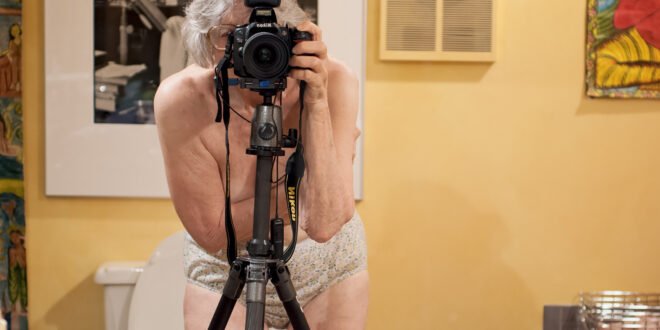Photographer Rosalind Fox Solomon was not afforded the opportunity to come into her own as an artist until her early 50s. For this reason, the visual component of A Woman I Once Knew — a decades-long archive of unflinching self-portraits from an artist heralded for her portraits of others — begins only in Solomon’s midlife. But the text of the book, written by Solomon herself, traces her life to its origins. With a remarkable economy of language, the volume lays out a nonagenarian life story containing an entire range of human experience, accompanied by images that strikingly and unapologetically highlight the aging female form.
Solomon was initially thwarted from her earliest inclinations toward reflection and self-expression by generational expectations: She was born in 1930 to a family of traditional aspirations in Highland Park, Illinois. After jettisoning her passion for reading and writing and marrying a Southern man nine years her senior who stringently limited the axis of her career outside their family; after bearing two children by C-section and balancing their upbringing with political volunteering and local activism; after the shifting fortunes of her family and the dissolution of her husband’s career, a decline in his health, and the final collapse of their marriage — only then, at the age of 53, did Solomon undertake to forge her way as an artist in the world.


And into the world she went — to the Peruvian Andes mountains, to Kolkata, India, to parts of Zimbabwe. In the late 1980s, she produced the groundbreaking series Portraits in the Time of AIDS, one of the first to turn its lens on the burgeoning epidemic while the political spin cycle was still firmly in denial. Vogue subsequently assigned her to photograph Women with AIDS, featuring sex workers in Honduras, with her editor emphasizing that the images “must be upbeat.”
Throughout the text, Fox Solomon cites the international network of contacts and handlers that helped her access some of the world’s most niche and dangerous milieus. Sometimes we see glimpses of these friends and professional contacts alongside her in candid images, but the majority are of the artist alone, often nude, generally serious.

None of the images in A Woman I Once Knew are captioned or dated, though they follow a roughly chronological progression through Solomon’s latter decades. Close-up captures of her body feature heavily, sometimes with interventions like masking tape or household props, often focusing on physical attributes that women are trained to conceal: hairy genitals, sagging breasts, a soft abdomen bearing the scars of multiple surgeries, feet disfigured by hammertoes and rotting nails. If Solomon made a name for herself through her willingness to turn an unfailing eye on the reality of her subjects, this book bears witness to the fact that she does not hesitate to afford herself the same treatment.
In 2019, the International Center of Photography awarded Fox Solomon a Lifetime Achievement award, and she has also received a National Endowment for the Arts Fellowship, a Lucie Achievement in Portraiture, and a Guggenheim Fellowship. Nonetheless, her text chronicles self-sabotage, psychosis, and the health struggles that most people encounter, in one form or another, as they move through their aging process, even with success and self-actualization through art. A Woman I Once Knew is a rare portrait of an artist who considers every aspect of her life and herself fair game and worthy of attention, right down to her bunions. As we collectively struggle against social and political forces that seek to constrain the way women move in the world and the choices we have — including agency over our own bodies — it is powerful to witness Solomon’s determination to capture and consider herself, no less important than all her other life’s work.



A Woman I Once Knew (2024) by Rosalind Fox Solomon is published by MACK Books and is available online and through independent booksellers.
Source link

